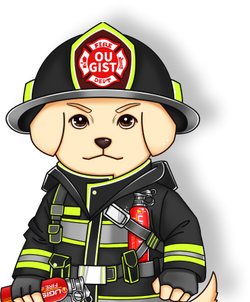The safety and well-being of your family and property are paramount, and being prepared for potential emergencies is a crucial aspect of responsible homeownership. One essential tool that every household should have is a fire extinguisher. In this blog post, we'll explore how to properly equip your home with fire extinguishers to enhance fire safety and ensure you're well-prepared in the event of a fire emergency.

Understanding Fire Extinguisher Placement:
Effective fire extinguisher placement is a key factor in maximizing their usefulness. Consider the following areas for placing fire extinguishers in your home:
-
Kitchen: The kitchen is a high-risk area due to cooking activities. Place a fire extinguisher in an easily accessible location, away from potential fire sources.
-
Garage and Workshop: Areas with tools, flammable materials, and electrical equipment are prone to fires. Install a fire extinguisher near the entrance for quick access.
-
Bedrooms and Hallways: Ensuring that fire extinguishers are accessible from bedrooms and hallways enhances the safety of sleeping occupants.
-
Living Areas: Consider placing a fire extinguisher in common living spaces where fires could potentially start, such as near fireplaces or electrical outlets.
Choosing the Right Type of Fire Extinguisher:

Different fire extinguisher types are designed to combat specific types of fires. The most common types include:
-
Class ABC Extinguisher: These multipurpose extinguishers are suitable for fires involving wood, paper, flammable liquids, and electrical equipment. They are versatile and often recommended for home use.
-
Class K Extinguisher: Ideal for kitchens, these extinguishers are designed to combat fires fueled by cooking oils and fats.
-
Class D Extinguisher: Used for fires involving combustible metals, these extinguishers are more specialized and typically found in industrial settings.
Key Considerations:
-
Quantity: Consider equipping your home with multiple fire extinguishers to cover various areas and potential fire risks.
-
Accessibility: Ensure fire extinguishers are easily reachable, avoiding obstructions and maintaining clear visibility.
-
Training: Educate your family members on how to use fire extinguishers properly. Practice using them safely and effectively.
-
Maintenance: Regularly inspect and maintain your fire extinguishers according to manufacturer guidelines and regulatory standards.
Steps to Equip Your Home:
-
Assessment: Identify high-risk areas where fires are more likely to occur, such as the kitchen, garage, or areas with electrical equipment.
-
Choose Types: Based on your assessment, select the appropriate type of fire extinguishers for each area.
-
Purchase: Acquire the selected fire extinguishers from reputable sources or retailers.
-
Placement: Install the extinguishers in strategic locations, ensuring easy access and visibility.
-
Educate: Train your family members on fire extinguisher use, emphasizing safety practices.


